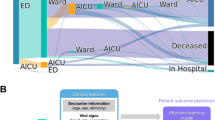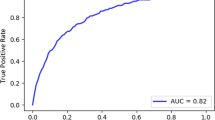Abstract
Critically ill patients often need Invasive Mechanical Ventilation (IMV) when treated at intensive care units (ICU). However, it is a complex treatment that most medical doctors avoid when possible. This technique demands appropriate equipment such as ventilators and specialized personal to operate it. Patients with Coronavirus Disease (COVID-19) may need IMV, usually for an extensive period. Due to the pandemic, IMV resources became scarce, and the decision to institute mechanical ventilation based on medical judgement should be avoided unless it is absolutely necessary. This study proposes the use of clinical and laboratory data from the 24 h preceding and succeeding the ICU admission and Machine Learning classifiers such as Random Forest (RF) to predict the probability of a patient requiring IMV. The proposed methodology is split into pre-processing, modelling, and feature selection. A wide range of different classifiers with a diverse set of variables were tested. The final model is an RF model with sixteen features and a \(91.88\%\) out of sample accuracy. It can predict if a patient needs IMV, and produce an explanation for the model using Local Interpretable Model-agnostic Explanation in seven seconds. We believe this to be an advantageous tool for supporting clinical decisions, minimize ventilator-associated complications and optimize resources allocation.
Access this chapter
Tax calculation will be finalised at checkout
Purchases are for personal use only
Similar content being viewed by others
References
B-Simple. https://www.b-simple.pt/. Accessed 28 Dec 2020
Bennett, S., et al.: Clinical features and outcomes of adults with coronavirus disease 2019: a systematic review and pooled analysis of the literature. Int. J. Clin. Pract. 75, e13725 (2020)
Bhattacharya, S., Rajan, V., Shrivastava, H.: ICU mortality prediction: a classification algorithm for imbalanced datasets. In: AAAI Conference on Artificial Intelligence, pp. 1288–1294 (2017)
Burki, T.K.: The Russian vaccine for COVID-19. Lancet Respir. Med. 8(11), e85–e86 (2020)
Cheng, F.Y., et al.: Using machine learning to predict ICU transfer in hospitalized COVID-19 patients. J. Clin. Med. 9, 1668 (2020)
Domingues, I., Amorim, J.P., Abreu, P.H., Duarte, H., Santos, J.J.: Evaluation of oversampling data balancing techniques in the context of ordinal classification. In: IEEE International Joint Conference on Neural Networks, pp. 1–8 (2018)
European Medicines Agency: Treatments and vaccines for COVID-19. https://tinyurl.com/y8t5jkv8. Accessed 28 Dec 2020
Fauci, A.S., Lane, H.C., Redfield, R.R.: Covid-19 - navigating the uncharted. New England J. Med. 382(13), 1268–1269 (2020)
FDA: Pfizer-BioNTech COVID-19 Vaccine. https://tinyurl.com/yd3gwlcn. Accessed 28 Dec 2020
Fialho, A., Cismondi, F., Vieira, S., Reti, S., Sousa, J., Finkelstein, S.: Data mining using clinical physiology at discharge to predict ICU readmissions. Expert Syst. Appl. 39(18), 13158–13165 (2012)
GOV.UK: Information for Healthcare Professionals on Pfizer/BioNTech COVID-19 vaccine (2020). https://tinyurl.com/yyhmeu6u. Accessed 28 Dec 2020
Junqueira, A.R.B., Mirza, F., Baig, M.M.: A machine learning model for predicting ICU readmissions and key risk factors: analysis from a longitudinal health records. Heal. Technol. 9(3), 297–309 (2019)
Komorowski, M., Celi, L.A., Badawi, O., Gordon, A.C., Faisal, A.A.: The artificial intelligence clinician learns optimal treatment strategies for sepsis in intensive care. Nat. Med. 24(11), 1716–1720 (2018)
Krajnak, M., Xue, J., Kaiser, W., Balloni, W.: Combining machine learning and clinical rules to build an algorithm for predicting ICU mortality risk. Comput. Cardiol. 39, 401–404 (2012)
Lemaître, G., Nogueira, F., Aridas, C.K.: Imbalanced-learn: a Python toolbox to tackle the curse of imbalanced datasets in machine learning. J. Mach. Learn. Res. 18(17), 1–5 (2017)
Myers, L.C., Parodi, S.M., Escobar, G.J., Liu, V.X.: Characteristics of hospitalized adults with COVID-19 in an integrated health care system in California. JAMA 323(21), 2195–2198 (2020)
Paules, C.I., Marston, H.D., Fauci, A.S.: Coronavirus infections-more than just the common cold. JAMA 323(8), 707–708 (2020)
Pedregosa, F., et al.: Scikit-learn: machine learning in Python. J. Mach. Learn. Res. 12, 2825–2830 (2011)
Pirracchio, R., et al.: Big data and targeted machine learning in action to assist medical decision in the ICU. Anaesth. Crit. Care Pain Med. 38(4), 377–384 (2019)
Ribeiro, M.T., Singh, S., Guestrin, C.: “Why should I trust you?” Explaining the predictions of any classifier. In: ACM SIGKDD International Conference on Knowledge Discovery and Data Mining, 13–17-August, pp. 1135–1144 (2016)
Richardson, S., Hirsch, J.S., Narasimhan, M., Crawford, J.M., McGinn, T., Davidson, K.W.: Northwell COVID-19 research consortium: presenting characteristics, comorbidities, and outcomes among 5700 patients hospitalized with COVID-19 in the New York City area. JAMA 323(20), 2052–2059 (2020)
Sacramento, R., Silva, R., Domingues, I.: Artificial intelligence in the operating room: evaluating traditional classifiers to predict patient readmission. In: Portuguese Conference on Pattern Recognition, pp. 17–18 (2020)
Thorsen-Meyer, H.C., et al.: Dynamic and explainable machine learning prediction of mortality in patients in the intensive care unit: a retrospective study of high-frequency data in electronic patient records. Lancet Digit. Health 2(4), e179–e191 (2020)
Van Rossum, G., Drake, F.L.: Python Software Foundation (2019). https://www.python.org. Accessed 28 Sept 2020
World Health Organization: Coronavirus Disease (COVID-19) (2020). https://www.who.int/emergencies/diseases/novel-coronavirus-2019. Accessed 16 Nov 2020
Acknowledgements
This work is a result of the project NORTE-01-02B7-FEDER-048416 supported by Norte Portugal Regional Operational Programme (NORTE 2020), under the PORTUGAL 2020 Partnership Agreement, through the European Regional Development Fund (ERDF).
Author information
Authors and Affiliations
Corresponding author
Editor information
Editors and Affiliations
Rights and permissions
Copyright information
© 2021 Springer Nature Switzerland AG
About this paper
Cite this paper
Serrano, D., Dias, C., Cardoso, B., Domingues, I. (2021). Predicting the Use of Invasive Mechanical Ventilation in ICU COVID-19 Patients. In: Tavares, J.M.R.S., Papa, J.P., González Hidalgo, M. (eds) Progress in Pattern Recognition, Image Analysis, Computer Vision, and Applications. CIARP 2021. Lecture Notes in Computer Science(), vol 12702. Springer, Cham. https://doi.org/10.1007/978-3-030-93420-0_1
Download citation
DOI: https://doi.org/10.1007/978-3-030-93420-0_1
Published:
Publisher Name: Springer, Cham
Print ISBN: 978-3-030-93419-4
Online ISBN: 978-3-030-93420-0
eBook Packages: Computer ScienceComputer Science (R0)





